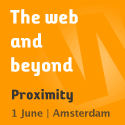As I've mentioned before in
my review of the 2005 IA Summit where Andrew Dillon spoke about the subject,
I feel that researchers and practitioners in our field should adhere to some set of ethical guidelines to prevent abuse or misappropriation of our work as much as possible. I just found out about a new set of guidelines for scientists on communicating with the media that could be interesting.
In the review I mentioned the
ACM Code of Ethics and Professional Conduct aimed at computing professionals. More recently I have found the set of guidelines for ubiquitous computing in Adam Greenfield's book
Everyware (if you want just the guidelines, read Adam's article All watched over by machines of loving grace: Some ethical guidelines for user experience in ubiquitous-computing settings as published in Boxes and Arrows).
So far, I didn't know of any other guidelines.
The new set announced today is the result of a European Commission program on "media, science & society - engagement & governance in Europe" (in short:
MESSENGER) and the guidelines are called
Guidelines for scientists on communicating with the media (PDF, 520KB).
(please note that these are the new guidelines. The link to them can be found at the bottom of the Messenger materials page; the first link on that page, "Guidelines on Science and Health Communication", refers to an old set from 2001 that doesn't mention ethics once.)So, what are the guidelines like? Well, the good news is, first of all, that for results of a no-doubt bureaucratic European Union program, they are very easy to read. There is a one-page checklist and all of the guidelines together are a mere 9 pages long. And, coming back to my search for ethical guidelines,
ethics is mentioned three times!
The bad news is however that it seems that
the writers of the guidelines seem to put the onus on the media when it comes to ethical issues. See for example this fragment from the guidelines:
"We have noted earlier that broad scientific areas such as biotechnology, nanotechnology, nuclear energy, etc. are also ‘framed’ in references to environmental, ethical or commercial issues. Journalists will often include the views of other actors and stakeholders, from representatives of consumers’ associations and single interest groups to politicians, priests and moral philosophers, as well as scientists conducting research in a particular field. This is a healthy process and illustrates, if such illustration is necessary, the extent to which science is embedded in society, rather than standing apart from it. It means, however, that when scientists are interviewed by journalists or broadcasters they are often invited to comment on these broader issues as well as on the specific scientific content of their research."
To me this sounds like researchers and practitioners only have to think about ethical issues
after they have completed their research or professional work, when journalists show up to ask nasty questions. I'd much rather see researchers include ethical considerations in their research programs
in advance. There is no mention of such an idea in these guidelines (which may not be a problem in itself, as these guidelines deal with communication with the media, but as I said before: I don't know of other guidelines.)
As Andrew Dillon mentioned in
his column in ASIS&T Bulletin in March 2002: "in a world where culture, politics and commerce impact the information spaces we inhabit as designers and users, it seems to me that the role of ethics in IA is one we overlook at our peril". He also writes: "while many fields had bodies of knowledge and specific methods, a
truly distinctive aspect of a profession was its formal recognition of a code of ethics for its members."
Where is the IA Code of Ethics?
 My proposal for a panel at the IA Summit was accepted: I will moderate a panel on design processes! The official title is "Where does IA fit in the design process?" and you can find its description on the IA Summit website.
My proposal for a panel at the IA Summit was accepted: I will moderate a panel on design processes! The official title is "Where does IA fit in the design process?" and you can find its description on the IA Summit website.









